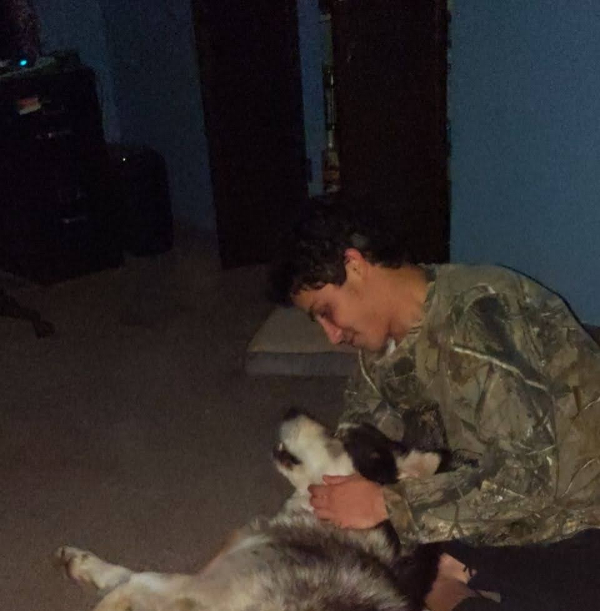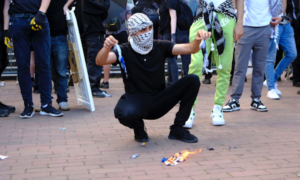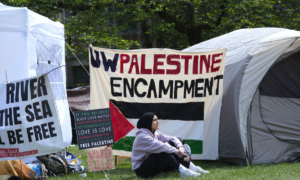“I would encourage you not to talk to me.”
Those aren’t words that someone would expect to hear from a human rights investigator. But Brian Castner, Senior Crisis Advisor at Amnesty International, is well aware of how consequences can catch up with a conflict zone whistleblower.
When it comes to large-scale conflict, there exists a constant element of uncertainty. Political biases, loyalties, and obligations tend to obscure or stifle what’s truly happening on the ground, leading to embellishment at best, and disinformation at worst. This “fog of war” can be a major impediment to all parties involved— opposing factions, civilians, and journalists. Affected too are neutral observers like Castner; independent arbiters of accountability tasked with reporting military misconduct.
“Specific words and contexts can really matter when you’re doing a legal investigation to a legal standard, as opposed to a journalistic standard,” Castner told us. “People will want to talk, but don’t always appreciate the capability of the government of where they live, or they don’t know that the US government is also listening… we’ve definitely had cases where somebody speaks to us [Amnesty Intl.] and then gets a visit from the government.”
Castner expounded on a previous assignment in East Africa as an example: “The US government, through military and non-military intelligence, is 100% listening to phone calls in Somalia. And there are certain things that if you say, the computer algorithm picks up and tells a person to start listening…”
“The US, in Somalia in particular, has a problem where they don’t differentiate… if you’re in a car with somebody who’s Al-Shabaab and you’re a man of a certain age, they’re just going to assume you’re also Al-Shabaab because you’re in a car with Al-Shabaab. There’s guilt by association,” Castner said, explaining how some civilians might find themselves targeted.
While Amnesty seems to fall short of definitively referring to such strikes by the US as “war crimes”, their coverage still goes far beyond perfunctory. Castner and his colleagues do extensive research, sifting through translated testimonies and compiling data in order to publish comprehensive analysis.
This past May, President Biden redeployed US troops to Somalia, reverting to the boots-on-the-ground military presence that former President Trump eschewed in favor of indiscriminate airstrikes. That conflict is not yet resolved, and Amnesty’s work there is far from done.
But since early this year, one conflict in Europe has occupied news cycles more so than most others in recent memory: the Russian invasion of Ukraine.
Having spent two weeks in besieged Ukraine this past March, Castner weighed in on how covering this war differed from his prior assignments: “Any of these attacks [cluster bombs, strikes in Kharkhiv and Mariupol] would be the kind of case that we would write up all on its own in other circumstances. The kind of cases that deserve individual documentation… Those cases are happening every 10 minutes. The pace of the violations is incredible.”

Use of cluster munitions specifically draws the most ire from war crimes investigators. Reporting from Vox details the history of cluster munition use in combat, the worst offenders, and the very few nations who still refuse to give them up: notably including the United States and Russia. Investigations by watchdogs like Amnesty have revealed extensive use of this weaponry in Ukraine. Quoted in The New York Times, Castner stated, “Any one of these indiscriminate attacks is unlawful, and they’re happening on top of each other.”
Naturally, the fog of war is heavy in Ukraine. Misinformation abounds from every angle. While Russia has been widely accused of using censorship and propaganda to aid in waging its invasion, the Kremlin is not the only entity standing to benefit from this confusion. Most notably, those behind the “Ghost of Kyiv” myth duped the public into heroizing a nonexistent 21st century Ukrainian fighter ace.
For those with immediate stakes in a conflict and for those paying attention worldwide, the wartime investigating and reporting that Amnesty carries out is crucial, not only to heighten awareness, but to strive for answerability from acting parties.
Perspective in conflict

In a world that coaxes you to look away, Brian Castner has chosen to be a witness. The Buffalo native served in the US Air Force specializing in explosives disposal, followed by work as both a journalist and author, before arriving at his current investigative position at Amnesty International. A soldier, recast as a sentinel.
“The number of people in the world who understand how bombs work, who understand how to do a post-blast investigation…the number of people who know how to do all those things is relatively small. It’s hard, it’s hard physical work, and it’s hard on the soul. But while I can still do both of those things, I feel an obligation to do it as a human being on this planet,” said Castner.
A wound will bleed unless you cauterize it, just as empathy will exude unless it’s held back. Castner recalled, “I’ve been doing this over 20 years now. The way that I interact with it has changed. I still have compassion for the people that I’m interacting with, that are caught in this, but I think I take it on personally in a very different way. You know, I used to go do a post-blast investigation in Iraq or something, and I would internalize what I saw. I would try to imagine what it was like, what it would be like to be the family member and have someone killed or to see your… you know, to be caught in this, whatever else. I stopped doing that, because it’s just so emotionally unhealthy. And it doesn’t affect the outcome.”
The juxtaposition between working as an investigator versus serving as a soldier is best expressed by someone who’s done both. “As a journalist and at Amnesty, you’re not supposed to interfere, you’re supposed to write down what’s happening. But as a soldier, I could stop the bombs going off. And now I’m supposed to watch the bomb go off and then say it was unlawful, right? So it is, it is definitely different,” Castner offered, almost forlornly.






















Be First to Comment